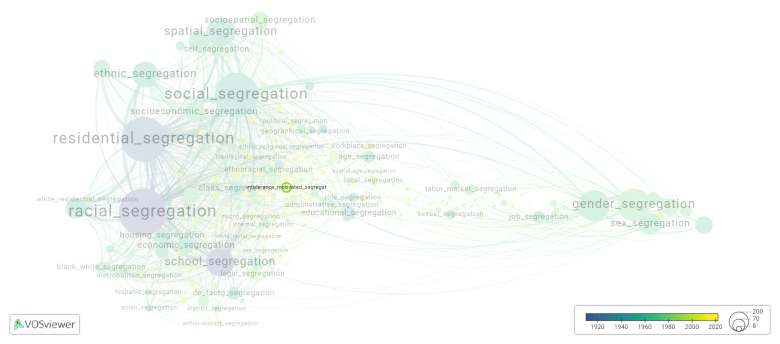Intolerance motivated segregation: Difference between revisions
(Creating page) |
(Creating page) |
||
| (9 intermediate revisions by the same user not shown) | |||
| Line 1: | Line 1: | ||
===== Date and country of first publication<ref>Date and country of first publication as informed by the Scopus database (December 2023).</ref>===== | |||
2005<br> | 2005<br> | ||
Israel | |||
===== Definition ===== | |||
Intolerance motivated segregation refers to the practice of segregating or separating individuals or groups based on their characteristics, beliefs, or identities due to an intolerance or prejudice towards those characteristics. This segregation can manifest in various forms, such as racial segregation, religious segregation, or discrimination based on gender identity or sexual orientation. | |||
This form of segregation is driven by biases, prejudices, or discriminatory attitudes held by individuals or institutions against certain groups. It often results in the exclusion, marginalization, or unequal treatment of individuals or communities deemed different or "other" by those in positions of power or influence. | |||
Intolerance-motivated segregation can have significant negative consequences, including perpetuating inequality, limiting opportunities for marginalized groups, fostering social division and conflict, and undermining social cohesion and unity. Efforts to address intolerance-motivated segregation typically involve promoting inclusivity, diversity, and equality, as well as combating prejudice and discrimination through education, legislation, and social activism. | |||
==See also== | ==See also== | ||
==Related segregation forms== | |||
Intolerance motivated segregation is frequently discussed in the literature with the following segregation forms: | |||
[[residential segregation]] | |||
[[File:intolerance_motivated_segregation.png|780x780px]] | |||
This visualization is based on the study [[Segregation_Wiki:About| The Multidisciplinary Landscape of Segregation Research]]. | |||
For the complete network of interrelated segregation forms, please refer to: | |||
* [https://tinyurl.com/2235lkhw First year of publication] | |||
* [https://tinyurl.com/2d8wg5n3 Louvain clusters] | |||
* [https://tinyurl.com/223udk5r Betweenness centrality] | |||
* [https://tinyurl.com/244d8unz Disciplines in which segregation forms first emerged (Scopus database).] | |||
==References== | ==References== | ||
== | ==Notes== | ||
<references /> | |||
{{NoteAI}} | |||
==Intolerance motivated segregation appears in the following literature== | |||
Omer I. (2005) | Omer I. (2005). How ethnicity influences residential distributions: An agent based simulation. ''Environment and Planning B: Planning and Design'', ''32''(5), 657-672. Pion Limited.https://doi.org/10.1068/b31156 | ||
Latest revision as of 07:17, 16 October 2024
Date and country of first publication[1][edit | edit source]
2005
Israel
Definition[edit | edit source]
Intolerance motivated segregation refers to the practice of segregating or separating individuals or groups based on their characteristics, beliefs, or identities due to an intolerance or prejudice towards those characteristics. This segregation can manifest in various forms, such as racial segregation, religious segregation, or discrimination based on gender identity or sexual orientation.
This form of segregation is driven by biases, prejudices, or discriminatory attitudes held by individuals or institutions against certain groups. It often results in the exclusion, marginalization, or unequal treatment of individuals or communities deemed different or "other" by those in positions of power or influence.
Intolerance-motivated segregation can have significant negative consequences, including perpetuating inequality, limiting opportunities for marginalized groups, fostering social division and conflict, and undermining social cohesion and unity. Efforts to address intolerance-motivated segregation typically involve promoting inclusivity, diversity, and equality, as well as combating prejudice and discrimination through education, legislation, and social activism.
See also[edit | edit source]
Related segregation forms[edit | edit source]
Intolerance motivated segregation is frequently discussed in the literature with the following segregation forms:
This visualization is based on the study The Multidisciplinary Landscape of Segregation Research.
For the complete network of interrelated segregation forms, please refer to:
References[edit | edit source]
Notes[edit | edit source]
- ↑ Date and country of first publication as informed by the Scopus database (December 2023).
At its current state, this definition has been generated by a Large Language Model (LLM) so far without review by an independent researcher or a member of the curating team of segregation experts that keep the Segregation Wiki online. While we strive for accuracy, we cannot guarantee its reliability, completeness and timeliness. Please use this content with caution and verify information as needed. Also, feel free to improve on the definition as you see fit, including the use of references and other informational resources. We value your input in enhancing the quality and accuracy of the definitions of segregation forms collectively offered in the Segregation Wiki ©.
Intolerance motivated segregation appears in the following literature[edit | edit source]
Omer I. (2005). How ethnicity influences residential distributions: An agent based simulation. Environment and Planning B: Planning and Design, 32(5), 657-672. Pion Limited.https://doi.org/10.1068/b31156

